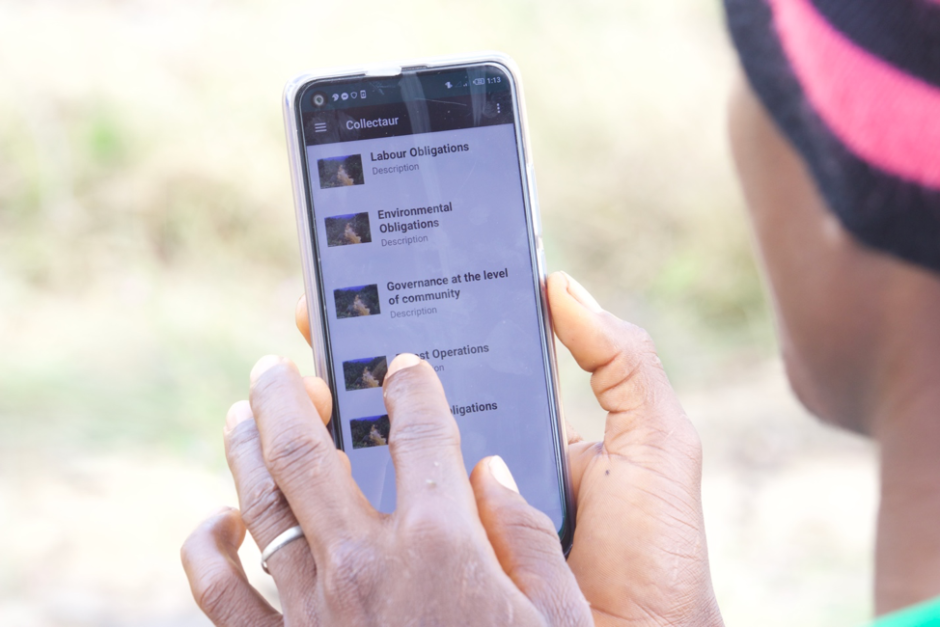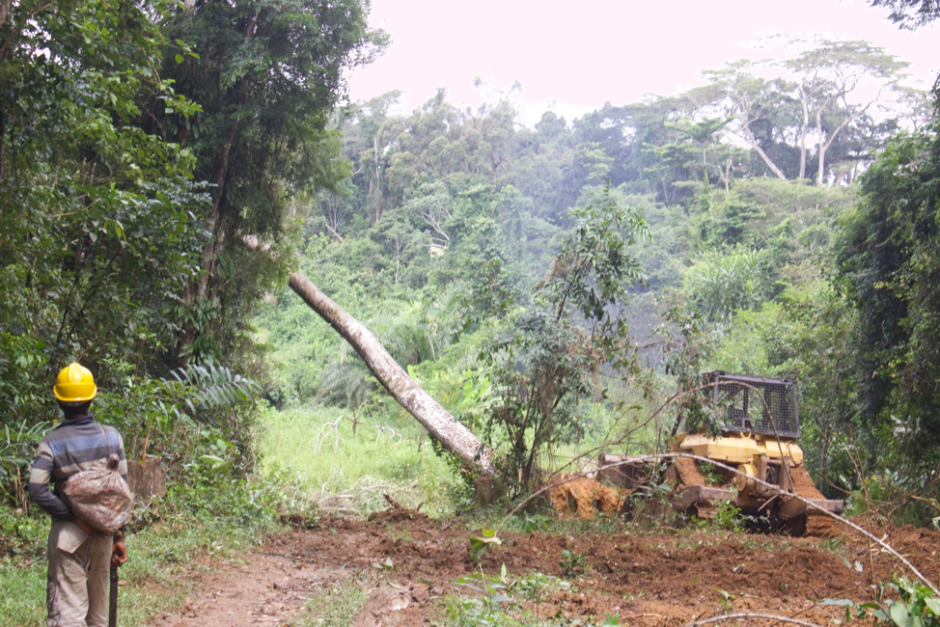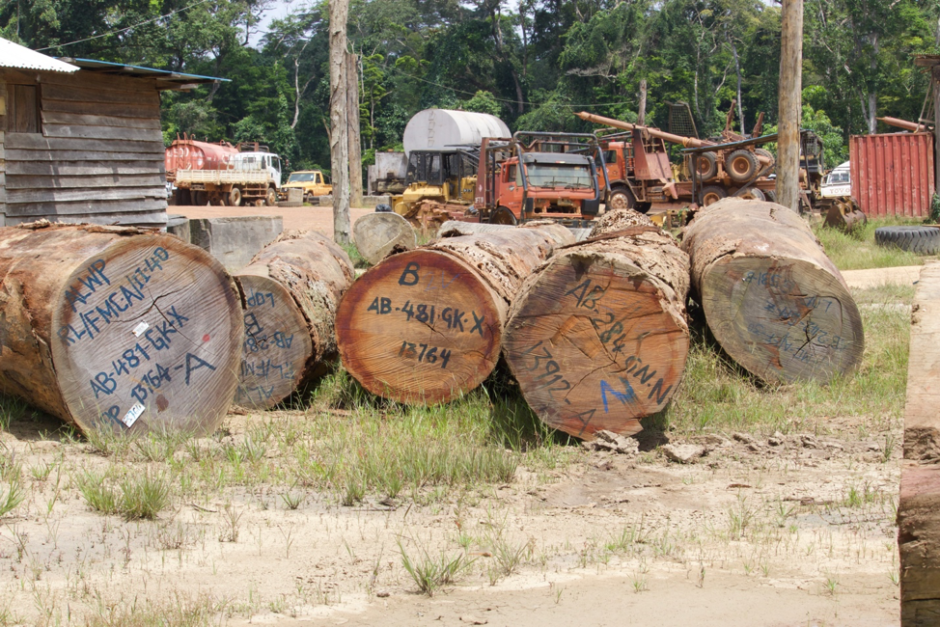
SALAYEA, Lofa County – Rural towns and villages are now using ForestLink, a new app, to track illicit forest operations and deforestation across Liberia, including illegal logging and mining, and poaching in their communities. The tool also makes it possible for them to store and share information on mobile phones in a short period of time from the places those unlawful activities are reported.
“This is one better way that we can improve the forest sector management and governance process,” says Samuel Kwenah, the contact person for the extractive industry and human rights at Save My Future Foundation (SAMFU. “This is a very good system that will help to ensure transparency and accountability in the forest sector. We are going to support it to the fullest.”
Developed by Rainforest Foundation (RFUK) in 2015, ForestLink is part of the group’s goal of strengthening community oversight in managing their forest resources. The technology forms part of growing international efforts aimed at ending illegal timber sales across West Africa’s tropical rainforest. Liberia is one of the latest countries where the app is being used. It has been in use in Cameroon, Democratic Republic of Congo, Ghana and Peru.
The app is a breakthrough for communities affected by logging concessions, who struggled over the years to keep companies and government in check, and intruders out of their forests. User-friendly, it asks the yes or no questions and can record details such as the diameter of trees. It has room for report on violations of forest laws and regulations.
“We are very excited and upbeat that the technology would make a significant difference. Tracking violations in the past proved to be difficult as volunteer would manually collect information from the field, come to Monrovia before preparing their reports,” says Roland Harris, the head of Independent Forest Monitors (IFM), the civil society group that is training community volunteers to use the app. “This took a lot of time, resources, and energy. By then, it was difficult to validate whether or not these reports were scientific or evidence-based.”
Since its introduction in Africa three years ago, the technology has made important inventions in helping Cameroonian and Peruvian authorities halt several instances of illegal forest operations and timber sales there. That is starting to happen in Liberia, too. Several violations have also been tracked in Lofa, Nimba, Grand Gedeh, Sinoe, and Gbapolu counties in the last 10 months, community volunteers say.
“According to reports that we have in our possession, logging companies are seriously operating out of their concession areas,” says Washington Kpawulu, a volunteer from the Mulbah Willie Village, situated four kilometers northeast of the Salayea District.
Kpawulu did not say what logging companies were involved and where the irregularities were recorded. However, Harris announced that that information on the violation would be released in the group’s first major report on the new technology in the first quarter of next year. Harris and team had planned to launch the report at the end of last month but did not meet deadline.

Challenges
But Harris says there are resource and logistical constraints, a need for mass awareness on the system across communities, and more volunteers. However, 22 local monitors have trained to operate the mobile technology in 12 forest communities, according to him.
“We have over 100 forest communities that we have to reach with this technology,” Harris says. “At the end of this November, we are going to engage in mass community awareness to tell our people about the potential benefits of this new system.”

Hope
Liberia has a bloody history with illegal logging, which is still an issue today.
During the country’s civil war (1989 – 2003) rebel factions used proceeds from illegal timber or “logs of war” to fund their wars. The United Nations imposed sanctions on Liberia’s timber in 2003 in an effort to stop the practice. Liberia rewrote its forestry law and placed communities at the core of the new era. A transparent process was put in place using barcodes to track logs from harvest to export. The codes are monitored by Société Générale de Surveillance (SGS), an independent Swiss firm. It was an integral part of the country’s forestry reform that led to the UN lifting of the sanctions in 2006.
The 2006 National Forestry Reform Law of Liberia gives communities the right to participate and benefit from their forest resources. However, implementation of the statute has been a problem. A widespread of abuse of logging contracts led to a scandal in 2013, the biggest since the end of the country’s civil conflict. Eight officials of the Forestry Development Authority (FDA), including Moses Wogbeh, its managing director were indicted. A report by Global Witness—an international NGO that helped steer Liberia’s forestry reform—last year found that logging companies were exploiting community forestry.
Kpawulu of Mulbah Willie Village, which falls within Alpha Logging and Wood Processing Company’s concession area, says the app is already breaking barriers and offers hope.
“I am happy that the arrival of this app has increased company compliance with community social development contracts,” he tells FrontPage Africa in an interview against the foggy, 119,240-hectare woodland between Gbapolu and Lofa counties. “Since the arrival of the technology, we can see that our market roads are being rehabilitated for the smooth movement of our people and transportation of goods.”
This story was in collaboration with New Narratives as part of our Land Rights and Climate Change Reporting Project. Funding is provided by the American World Jewish Service. The funder had no say in the story’s content.
